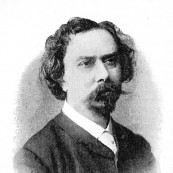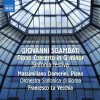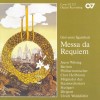Composers
Giovanni Sgambati (May 28, 1841, Rome – December 14, 1914, Rome) was an Italian composer.
Born to an Italian father and an English mother, Sgambati, who lost his father early, received his early education at Trevi, in Umbria, where he wrote some church music and obtained experience as a singer and conductor. In 1860 he settled in Rome, and took up the work of winning acceptance for the best German music, then, as always, neglected in Italy. The influence and support of Franz Liszt, who was in Rome from 1861, was naturally of the greatest advantage to him, and concerts were given in which Sgambati conducted as well as played the piano.
His compositions at this period (1864–1865) included a quartet, two piano quintets, an octet, and an overture. He conducted Liszt's Dante Symphony in 1866, and made the acquaintance of Richard Wagner's music for the first time at Munich, whither he travelled in Liszt's company. His first album of songs appeared in 1870 (Schott Music), and his first symphony was played at the Palazzo del Quirinale in 1881; this, as well as a piano concerto, was performed in the course of his first visit to England in 1882; and at his second visit, in 1891, his Sinfonia epitalamio was given at the Philharmonic.
His most extensive work, a Requiem Mass, was performed in Rome 1901. His many pianoforte works have won permanent success; but his influence on Italian musical taste has been perhaps greater than the merits of his compositions, which, though often poetical and generally effective, are considered slight.
Recently Added
| Country: | Italy |
| Period: | Romantique |
Biography
Giovanni Sgambati (May 28, 1841, Rome – December 14, 1914, Rome) was an Italian composer.
Born to an Italian father and an English mother, Sgambati, who lost his father early, received his early education at Trevi, in Umbria, where he wrote some church music and obtained experience as a singer and conductor. In 1860 he settled in Rome, and took up the work of winning acceptance for the best German music, then, as always, neglected in Italy. The influence and support of Franz Liszt, who was in Rome from 1861, was naturally of the greatest advantage to him, and concerts were given in which Sgambati conducted as well as played the piano.
His compositions at this period (1864–1865) included a quartet, two piano quintets, an octet, and an overture. He conducted Liszt's Dante Symphony in 1866, and made the acquaintance of Richard Wagner's music for the first time at Munich, whither he travelled in Liszt's company. His first album of songs appeared in 1870 (Schott Music), and his first symphony was played at the Palazzo del Quirinale in 1881; this, as well as a piano concerto, was performed in the course of his first visit to England in 1882; and at his second visit, in 1891, his Sinfonia epitalamio was given at the Philharmonic.
His most extensive work, a Requiem Mass, was performed in Rome 1901. His many pianoforte works have won permanent success; but his influence on Italian musical taste has been perhaps greater than the merits of his compositions, which, though often poetical and generally effective, are considered slight.









